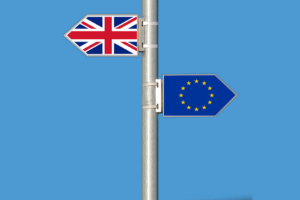Opinion
Danish Capital in 2023: More than Brexit, the Brits never fully recovered from the Financial Crisis
Neil Smith
This article is more than 2 years old.
OPINION: Simply put, the UK was hit harder by the events of 2007 and 2008 than most other countries

The roadmap irreversibly changed in 2007, not 2016 (photo: Pixabay)
Britain, the birthplace of the industrial revolution, is in a funk. The country’s economy has scarcely grown in the last 15 years. During this time, median incomes have risen by a measly 12 percent – worse, the bottom decile’s median income has increased by only 2 percent.
Worst of the best
To fully understand the extent of Britain’s stagnation, let’s take the 17 countries most similar to it: the 13 other northwestern European countries, along with the USA, Canada, Australia and New Zealand.
Of the 18 countries, France and New Zealand have an income per capita broadly similar to the UK, but the other 15 countries are ahead of it.
That energy-rich Norway and the dynamic USA are substantially richer than the UK is no surprise. But countries often viewed as comparable are also vastly richer – for example, the Netherlands and Australia are annually $10,000 per person wealthier than the UK. Just think of what you could do with an extra $800 a month!
Broken before Brexit
Some will say these are mere numbers and that money is not everything. Wealthy Brits don’t really need the extra money – but for the tens of millions who are “just about managing”, hundreds of dollars extra a month would be a gamechanger.
And at least part of the reason for Britain’s under pressure public services, particularly the National Health Service and creaking infrastructure, is a lack of resources. Higher incomes would mean a higher tax take, and more resources would go a long way to improving public services.
The reasons for Britain’s underperformance are less clear-cut. Some will point to Brexit, but the issue predates that. Whilst the self-inflicted blow of Brexit has led to higher costs at the supermarket, a reduction in business investment and complications for exporters, Brexit is both cause and effect. The lack of growth in ordinary wages led to a belief that the system wasn’t working.
Financial Crisis woes
One explanation is that the UK was hit harder by the global financial crisis than many other countries. This was natural enough given the huge financial services sector.
However, no other industry has been able to pick up the slack. This reflects long-term issues like mediocre mass education, underdeveloped infrastructure, a low level of business investment and an overly complicated planning system. Any attempt to improve matters needs to fix these issues.
None of the above is to say the UK doesn’t have assets. The City of London, British soft culture, some of the best educational establishments in the world and the English language are all major assets.
However, the first point of dealing with any problem is to accept the scale of it. And there is no question that the UK is now as poor (relatively speaking) than it has ever been.

About
Neil Smith
Neil is a Scottish-educated lawyer with 18 years’ experience in corporate structuring and general commercial matters. Based in Copenhagen, he primarily advises on international deals. Out of the office, his interests include sports and politics. His column explores topical international financial and economic issues from a Danish perspective.










































